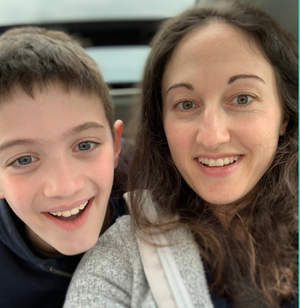This first appeared inside the ADHD Enclave. It was written based on notes from a recent collaborative meetings.
Tonight I challenged you to talk about having HARD conversations. About ADHD, but also about all the other things that come up in relationships.
Hiding parts of yourself never works
So I hear stories all the time about women hiding financial stuff, personal history, mental health, and yes ADHD.
The thing about life is that hiding never works. It hurts you and the other party and it never ends well. Plus it takes a sh-t ton of executive function to compensate for whatever you're hiding.
In order to have a successful relationship you need to practice what I like to call uncomfortable honesty.
Some of us have put it all out in our current relationships. The results weren't bad this time, but we've had experiences where too much information scares someone off.
If someone rejects you specifically because of ADHD, or some other disability, they probably shouldn't be in your life anyway.
Some of us admit that early in our relationships we "perform" a lot, and hold down all the corks. Eventually when we can't do it anymore there is a big reveal. If we're lucky, our partner is curious and wants to know more. If we're less likely our partner might feel upset that we had covered up so much.
Talking about ADHD specifically
For some of us, the conversation with our partners about ADHD went well. They were curious, or felt that it made a lot of sense, and were willing to work with us on an ongoing basis.
We've had less successful conversations with family members. Some of us have been outright dismissed, or told to WORK THROUGH it, and buckle down.
We discussed the idea that sometimes people will respond in a way that they think is helpful - "oh you'll work it out. You're so smart." - And while they are trying to be kind, it FEELS to us like a dismissal.
These types of comments are an oversimplification of a very complex issue.
Unfortunately families are sometimes even more difficult than romantic relationships. They know how to push our buttons, and they have their own perceptions of us and our behaviors.
When you introduce a topic like ADHD to a family that already struggles to validate each other's experiences, you're bound to run into hostile reactions.
People associate a diagnoses with a defect. And some people are inconvenienced by the reality that you are asking for some level of understanding and support.
Teaching someone you love about ADHD
We talked a bit about how to explain your experience to someone who is willing.
Some people respond to science, and talk about the brain. When you find someone that is interesting, this can be a really fun discussion because it's an opportunity to spread real*** information instead of allowing the person to make assumptions, or believe the misinformation.
The other cool part about the neurology, is it carries a more "medical" feel. Most Americans still aren't comfortable with anything even tangentially related to mental health.
Another technique we discussed we using concrete examples from your relationship to show the person, "this is how it shows up." It gives them a frame of reference to work from.
Last, I've always heard that you should talk about symptoms. Tell the person how you feel, what you struggle with, and give examples. Sometimes the symptoms are easier for people to understand than saying, "ADHD."
Everyday life with a partner
I know you have ADHD but....is basically the worst thing to hear in a long-term relationships.
Life with EF challenges is hard for us, and it does wear on partners. So managing the day-to-day becomes very important. The negotiation never ends.
We discussed the fact that sometimes the distribution of work in a couple is NOT equal. And that tension has to be managed.
Each partner has to take into consideration what is most important to the other.
For example, I like to control the laundry and the food shopping. Those are important to me, but yet I don't like to cook. My husband tolerates my two meals per week, and my piles of CLEAN laundry. Because it's not worth fighting over.
He does the outside work, the vacuuming, cleaning bathrooms, Target runs trash night. AND he organizes all of the paperwork and important bills/documents.
I do literally 2 household tasks. He does the rest. This is not equal on paper. But guess who does the school stuff?
I asked my husband a long time ago why he doesn't get more angry at the condition of our house.
"It's not a deal breaker." That's his response.
He's learned the art of letting things go.
These conversations have to happen over and over again.
Just ask
The last point that we discussed was the idea of ASKING.
If you hear your partner sighing and you know they are frustrated, just ask.
If you can't interpret a comment, just ask.
If your partner does something and you're wondering if they are angry because you didn't do it, just ask.
Don't try to be a mind reader. Unless you are. Then go ahead.
